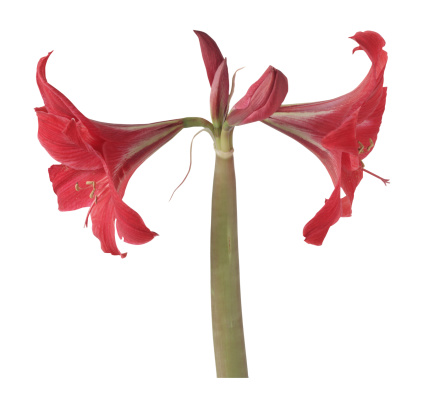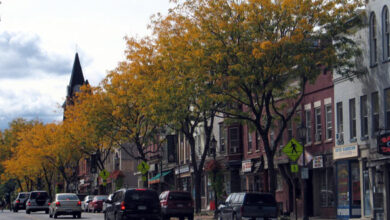Try amaryllis for holiday decor and gifts

There are many beautiful plants associated with the Christmas/holiday season:holly, ivy, poinsettias, Christmas cactus and cyclamen – but one of the most impressive of holiday blooms is the amaryllis (Hippeastrum species), which bears stunning 6 to 10 inch trumpet shaped flowers on 1 to 2 foot stalks or scapes.
Watching the bulbs sprout and develop is a happy memory from my childhood – but that can take time – some sources say that depending on variety, the bulbs can take 2 to 8 weeks just to sprout (typically they bloom 4 to 8 weeks from dormancy). You can purchase plants which are already in bud or bloom if you want the blossoms for Christmas, but these stunners are a welcome addition to your home at any time during the winter months.
Colors range from red/scarlet to pink, white, apricot, rose, bi-color and picotee -which have petals with a contrasting edge color – they all look great with the evergreen colors of Christmas and can brighten your home through February.
If you want to try growing them from bulbs, select those which are firm and dry and have no signs of decay, mold or injury. As with most bulbs, bigger really is better and the size of amaryllis bulbs can be quite impressive.
Amaryllis bulbs prefer a smaller container, so select a pot that is deep enough to allow for good root development and that has drainage, but with a diameter 1-2 inches larger than that of the bulb. Use a high-quality potting medium that drains well and is high in organic material.
Position the bulbs with the pointed end up and make sure at least one-third – preferably one-half – of the bulb is above the surface of the potting medium. You might also want to provide staking to support the developing stem.
Firm the potting medium around the bulb and water thoroughly. Place the bulb in a warm and sunny spot, and, to prevent bulb rot, water only the top one inch of the potting medium when it becomes dry to the touch. The bulb may not require watering again until after it sprouts.
When you see growth begin, fertilize regularly with a high-phosphorus fertilizer and rotate the pot to keep the flower stalks straight as they grow. You can try to encourage the bulb to sprout more quickly by placing it on a propagation mat.
Once the flower buds begin to show color, move the pot out of direct sunlight to prolong the bloom time.
Amaryllis blooms also make spectacular cut flowers. Cut the stems when the first bud is colored and ready to open. Make a cut across the bottom of the stem. If the stem splits and curls, don’t worry, it will not affect the bloom. This may happen because the stem is hollow.
After bloom time, if you decide you want to rebuild the bulb for another year, cut the flower stalk 3-5 inches above the bulb after the flowers have faded and the stem has turned yellow. DO NOT cut the leaves, they will help rebuild the bulb. Place the plant in a sunny window and water when the top two inches of potting medium are dry to the touch. Empty any excess water that drains from the pot. Fertilize monthly with a water soluble fertilizer.
Set outside when the danger of frost has passed in the spring. Acclimate the plant by placing it first in the shade and gradually moving to a spot with full sun. Keep fertilizing with a houseplant fertilizer.
Before the first frost, bring the plant back inside and place in a dark basement or cool closet. Stop watering and remove foliage when it becomes dry. After a resting phase of 8 to 12 weeks (or when new growth appears) bring it back into the light and water thoroughly. Flower stalks usually appear first, but are sometimes preceded by leaves.



